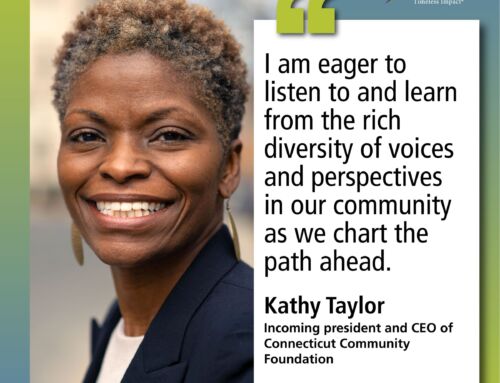
Left image: Chef Phil (staff) serving soup at the St. Vincent DePaul Mission soup kitchen. Three right images: Various community volunteers serving food. This Waterbury location has a commercial kitchen allowing for an upcoming culinary training program that will enable people experiencing homelessness to develop skills to re-enter the workforce.
Culinary Training Program Will Change Lives and Provide Second Chances
When St. Vincent DePaul Mission of Waterbury set out to provide an equity-based, sustainable approach to end homelessness, they understood that they would need to provide opportunities for their homeless shelter guests to reestablish their self-esteem, self-determination, and self-sufficiency with creativity and dignity.
After 44 years of operation, the organization now offers a robust infrastructure of programs that support shelter guests as they reintegrate into their communities. Services include a thrift store, supervised living for the chronically mentally ill, affordable housing, a soup kitchen and food pantry, and an emergency shelter.
Edwin Rodriguez, director of development and public relations states, “This network of programs is designed to address each cause contributing to or allowing a person or family to become homeless.”
A new culinary training program stands out as a promising model to prepare shelter guests and under-served people in the community to rejoin the workforce. St. Vincent De Paul Mission’s soup kitchen and food pantry— which together provide over 300 cooked meals per day and an equivalent of 45,000 meals per year—already rely on an on-site commercial kitchen. While job placement is one of the most challenging barriers to integration for people experiencing homelessness, culinary training programs across the nation have proven effective at helping the most disadvantaged job seekers find work in the food industry and advance to employment options that meet their long-term needs and interests. Creating a program that leverages St. Vincent Daul Mission’s kitchen infrastructure and promises long-term employment opportunities for those it serves makes great sense.
To launch the program in spring 2022, Connecticut Community Foundation awarded the Mission a $50,000 grant from their Covid-19 Recovery and Resilience Fund. An additional $21,500 Area of Greatest Need Fund from the Foundation will enable the organization to hire a chef instructor, which will be called the Merriman Culinary School Program.
The class will have approximately 8 -10 students for each of 3 sessions. Participants will attend Monday through Friday from 9:00 a.m. – 3:30 p.m. for a total of 12 weeks. The curriculum covers all facets of cooking in a commercial kitchen setting. Students will participate in hands-on training and classroom work instructed by an accredited chef instructor, as well as internships in area businesses providing food service. In addition, all students will train in life skills and job readiness skills such as punctuality, work ethic, teamwork, basic computer literacy, and financial management. Upon successfully completing the program, students will take an exam called the ServSafe Manager course, recognized by the National Restaurant Association. All graduates will be awarded a Certified Food Protection Certificate through the successful completion of the ServSafe exam. Graduates will also receive job placement assistance.
“With this new program, we hope to be a catalyst for social change, helping our community’s unemployed bridge the skills gap, enter the workforce, and achieve economic self-sufficiency, ” said Rodriguez. “The South End of Waterbury, where this program will be offered, has been identified by the Working Cities Initiative as an area of aggravated racial disparities in employment, wealth, healthcare, housing, and criminal justice. The culinary job training program specifically addresses supporting the development of jobs and career pathways with livable wages. This job program will welcome people facing barriers to employment, including those with histories of incarceration, substance abuse, homelessness, or long-term joblessness to provide economic opportunity and a sustainable change in their future.”
Upon obtaining certification, graduates are assisted in a job search to obtain full-time employment at local restaurants, hotels, caterers, institutions, and other hospitality businesses. Through the program, students will be empowered with essential culinary training, hands-on experience, a referral network, and, most importantly, the confidence to embark on a new career path.







